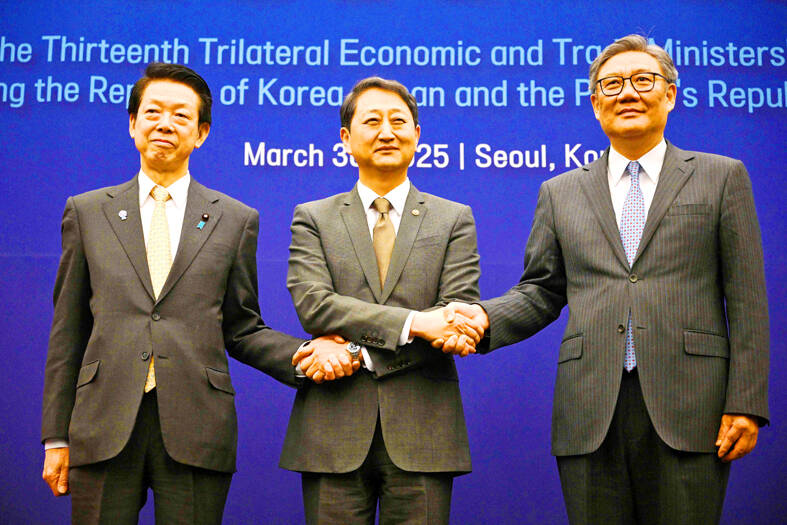China, South Korea and Japan yesterday agreed to strengthen free trade in the face of a raft of new tariffs imposed by US President Donald Trump.
The agreement came at a meeting of top trade officials — the first at that level in five years — days ahead of the start of tariffs on a huge range of US imports, including cars, trucks and auto parts.
South Korea and Japan are major auto exporters, while China has also been hit hard by US tariffs. The meeting was attended by South Korean Minister of Industry, Trade and Energy Ahn Duk-geun, his Japanese counterpart Yoji Muto, and Chinese Minister of Commerce Wang Wentao (王文濤).

Photo: AFP
The three countries called for their negotiations for a comprehensive trilateral free-trade agreement to be sped up, and agreed to create “a predictable trade and investment environment,” a statement said.
The three countries must respond “jointly” to shared global challenges, Ahn said.
“Today’s economic and trade environment is marked by increasing fragmentation of the global economy,” he said.
“The international environment surrounding us is constantly changing, and uncertainties are increasing,” Japanese trade official Yasuji Komiyama told a news briefing.
Ahn emphasized that protectionism was “not the answer” and urged efforts to ensure the WTO functions properly to “safeguard the stability and predictability” of global commerce, the South Korean trade ministry said.
Trump has promised tariffs tailored to each trading partner from Wednesday to remedy practices he deems unfair.
However, he also told reporters last week that there would be “flexibility,” and markets appeared to react with some relief at the end of last week.
Following the meeting between the three ministers, they also held bilateral meetings gatherings.
Muto said regardless of domestic “political circumstances in either country,” he hopes that exchanges and cooperation would continue with South Korea.

SECURITY: As China is ‘reshaping’ Hong Kong’s population, Taiwan must raise the eligibility threshold for applications from Hong Kongers, Chiu Chui-cheng said When Hong Kong and Macau citizens apply for residency in Taiwan, it would be under a new category that includes a “national security observation period,” Mainland Affairs Council (MAC) Minister Chiu Chui-cheng (邱垂正) said yesterday. President William Lai (賴清德) on March 13 announced 17 strategies to counter China’s aggression toward Taiwan, including incorporating national security considerations into the review process for residency applications from Hong Kong and Macau citizens. The situation in Hong Kong is constantly changing, Chiu said to media yesterday on the sidelines of the Taipei Technology Run hosted by the Taipei Neihu Technology Park Development Association. With

A US Marine Corps regiment equipped with Naval Strike Missiles (NSM) is set to participate in the upcoming Balikatan 25 exercise in the Luzon Strait, marking the system’s first-ever deployment in the Philippines. US and Philippine officials have separately confirmed that the Navy Marine Expeditionary Ship Interdiction System (NMESIS) — the mobile launch platform for the Naval Strike Missile — would take part in the joint exercise. The missiles are being deployed to “a strategic first island chain chokepoint” in the waters between Taiwan proper and the Philippines, US-based Naval News reported. “The Luzon Strait and Bashi Channel represent a critical access

‘FORM OF PROTEST’: The German Institute Taipei said it was ‘shocked’ to see Nazi symbolism used in connection with political aims as it condemned the incident Sung Chien-liang (宋建樑), who led efforts to recall Democratic Progressive Party (DPP) Legislator Lee Kun-cheng (李坤城), was released on bail of NT$80,000 yesterday amid an outcry over a Nazi armband he wore to questioning the night before. Sung arrived at the New Taipei City District Prosecutors’ Office for questioning in a recall petition forgery case on Tuesday night wearing a red armband bearing a swastika, carrying a copy of Adolf Hitler’s Mein Kampf and giving a Nazi salute. Sung left the building at 1:15am without the armband and apparently covering the book with a coat. This is a serious international scandal and Chinese

COUNTERINTELLIGENCE TRAINING: The ministry said 87.5 percent of the apprehended Chinese agents were reported by service members they tried to lure into becoming spies Taiwanese organized crime, illegal money lenders, temples and civic groups are complicit in Beijing’s infiltration of the armed forces, the Ministry of National Defense (MND) said in a report yesterday. Retired service members who had been turned to Beijing’s cause mainly relied on those channels to infiltrate the Taiwanese military, according to the report to be submitted to lawmakers ahead of tomorrow’s hearing on Chinese espionage in the military. Chinese intelligence typically used blackmail, Internet-based communications, bribery or debts to loan sharks to leverage active service personnel to do its bidding, it said. China’s main goals are to collect intelligence, and develop a